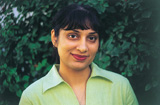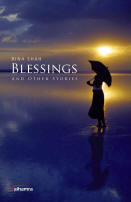|
Blessings and Other Stories
Bina Shah
|
|||||
Khadija, his wife, always jokes with Bashir that he is now in the prime of his life. But he feels the weight of years stripping away the frivolous parts of his personality, adding extra responsibilities and a new way of looking at the world that he could not have anticipated or even fathomed in his twenties or his thirties. Along with the decades have come a new realization that the spiritual world is calling to him, urging him to give God a place in his life much as he had given a place to his wife, his favorite music and the newspapers he enjoyed on his tea breaks in the hospital. Bashir washes himself carefully and finds his prayer mat, and in a few moments he is standing, bowing, kneeling, touching his head to the floor and whispering the Arabic prayers that he disregarded in his youth. He remembers briefly how he used to run away from his Quranic teacher, who pinched and hit his hands when he mispronounced the words or failed to memorize a kalima. He finds himself oddly grateful for the man’s misguided tenacity now; he remembers the maulvi in his prayers, and asks God to bless the man for teaching him to pray and read the Quran. The sun rises, and with it, so does Khadija. She prepares a cup of tea for him and offers him the newspaper, but today he waves it away. She looks at him quizzically. “The polio drive, remember?” he says, quickly swallowing the last piece of buttered toast. “Oh yes. Where is it today?” “Jinnah Colony.” “Ah.” It is only one word, but it conveys oceans and peaks in its single syllable. Familiar oceans and familiar peaks, as they have been through the arguments and the discord for years, ever since Bashir decided that he wanted to move back to Pakistan. Khadija had always been opposed to the move. “What are we going back for?” she said to him every day, a whisper, a shout, an entreaty, a tearful plea, depending on her mood and the particular anxiety that gripped her on that day. “There’s nothing there, nothing. You’re so well established here. Everyone respects you. You wouldn’t get that respect over there. They’re shooting doctors, you know.” When I first came to America, I followed these conversations with amazement, observing, with a vague sense of wonder, how the weather could make friends out of strangers. The rain back home didn’t seem to have the ability to do that, nor did it make any noise; instead, it informed you of its arrival through other senses than sound. First came the smell of the earth bursting in the heat, the burning, acrid smell of winged insects being born and dying in the sordid summer sun. My nose grew heavy and painful, both with the smell and with the prickling pain of hay fever that I’d never been able to beat. Then followed the overripe scent of heavy clouds, faintly underlaid with cut grass and rotting mangoes. Finally, the rain arrived, smelling sweet and dusty with promise. It’s a small town in upstate Maine that now boasts my name in the telephone book and my records at a downtown registrar’s office – Fairuza Rizvi, right between Rinkmann and Ross; newly arrived from Pakistan to do my residency in this tiny town called Remembrance, an awful name for someone who wants to do nothing but forget. And hay fever plagues me here, too, in this new place I’ve come to call my home. My nose swells and hurts, right beneath the bridge, and sometimes I have to stop what I’m doing and hold it pinched between my thumb and forefinger to relieve the pain. I had thought the change in environment might help, but I’ve only made it worse by coming here. The town is small, a throwback to the 1950s in its tawdry charm. There is a drugstore at the corner where an ancient waitress serves up sticky sundaes and charming banana splits. I ate one there once and the cold and the sweetness of it gave me the worst migraine I’ve ever had: all clawing animals and city drills inside my head. People in Remembrance claim to leave their doors unlocked but they all keep shotguns in the bedroom closets; to vote Republican is a matter of pride, to call yourself a liberal or a Democrat is akin to declaring your allegiance to Stalin in the middle of Main Street. People in Remembrance speak with nasal accents that took me a month to get used to. My own accent, the British words I’d grown up using instead of their American counterparts, bothered them at least as much as theirs did me. “What was that you said you wanted?” “The lift? I have to get to the fourth floor. Do you know where the lift is?” “Oh, the elevator! Hey, Sam, listen to this girl. She wants a lift to the fourth floor! Are you from England or something?” I
was lucky, though, that I hadn’t gone to Texas or down to South
Carolina, where in the supermarket or at the bank a heavy accent is only
a mild annoyance, but in the hospital, where lives depend on
comprehension and efficiency, it can be a real liability. I once saw a
fellow resident from south India reduced to tears because a senior
resident had, at the end of a long rotation, been too exhausted to try
to understand the boy’s thick Indian accent. “Get the hell off my ward
until you talk like an American!” he’d shouted, and the rest of us
stared as the boy dissolved like one of the cardboard sandwiches served
in the hospital cafeteria. The chief resident hadn’t even taken a
backwards look as he stormed out of the ward. |
||||||
 |
BINA SHAH was born in
Karachi but spent her early years in Virginia and completed her later
education in Massachusetts. She studied at Wellesley College and the
Harvard Graduate School of Education. She has worked as a journalist
and is well known for her writing on the South Asian Web site Chowk.
Her first book, a volume of short stories called Animal Medicine, was
published in 2000. Her novel, Where They Dream in Blue in 2001 and
Cyber Cafe in 2004 was published
by Alhamra. This is her third book by Alhamra. |
|||||

